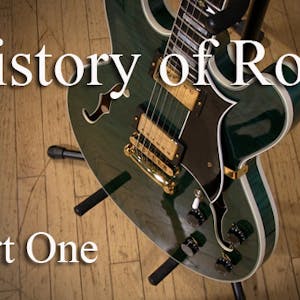This engaging course delves into the captivating history of rock music, tracing its roots and evolution from the pre-1950s era through the dynamic 1960s. Students will gain insights into the cultural impact and musical intricacies of influential artists such as Elvis Presley, the Beatles, and Jimi Hendrix. The course also examines the interplay between music business developments and technological advancements, shaping the diverse rock music styles that emerged. Through in-depth exploration, learners will grasp how rock music became the voice of an emerging youth culture and was associated with rebellion.
Key course highlights include:
This course offers a compelling journey through the history of rock music, providing a comprehensive understanding of its cultural significance and musical evolution during a transformative era.
Certificate Available ✔
Get Started / More Info
The course modules provide a detailed exploration of the history of rock music, covering pivotal eras, influential figures, and significant cultural shifts that shaped the evolution of the genre.
Module 1 offers an introduction to the course, providing an overview of the content and the instructor. It also covers essential music fundamentals and listening guides to prepare students for the comprehensive exploration of rock music history.
Module 2 delves into the world before rock and roll, spanning the early 1900s to 1955. It explores the music business, the role of radio, and the emergence of genres like country & western, rhythm and blues, and gospel.
Module 3 focuses on the birth and first flourishing of rock and roll from 1955 to 1959, examining the rise of youth culture, the impact of radio and records, and the pivotal role of artists like Elvis Presley and the day the music died.
Module 4 explores the demise of rock and the rise of soul from 1959 to 1963, covering the search for the next Elvis, the Brill Building approach to pop, the folk revival, and the emergence of surf music.
Module 5 delves into the Beatles and the British Invasion from 1964 to 1966, examining the rise of the Beatles, their influence on American pop music, and the emergence of other British bands like the Rolling Stones, the Kinks, and the Who.
Module 6 explores American responses from 1965 to 1967, focusing on artists like Bob Dylan, the impact of folk rock, the legacy of Phil Spector, and the emergence of garage bands and TV rock.
Module 7 delves into Motown pop and southern soul from 1960 to 1969, examining the impact of Motown and Stax Records, the emergence of soul music, and the influence of artists like James Brown.
Module 8 provides an in-depth exploration of psychedelia from 1966 to 1969, covering the influence of LSD, the rise of the hippie aesthetic, and the emergence of psychedelic music in San Francisco, London, and beyond.
Finally, Module 9 includes the final exam, allowing students to demonstrate their comprehensive understanding of the course content and the evolution of rock music from the 1950s to the 1960s.
El Músico Moderno te prepara para triunfar en la industria musical contemporánea con sólidos conocimientos en teoría, producción y composición musical.
This course explores the intersection of art and social movements, challenging learners to engage in cultural activities while examining contemporary art practice...
Pro Tools Basics is a 4-week course providing an introductory look into the world of Avid Pro Tools and Pro Tools First, focusing on recording, mixing, and mastering...
This course offers the opportunity to develop your personal essay or memoir writing skills, guiding you in finding your voice and crafting a captivating narrative...